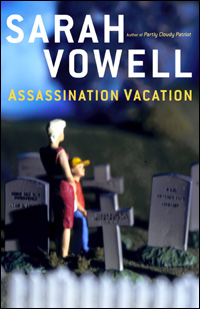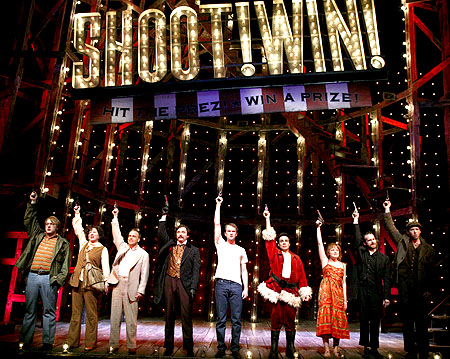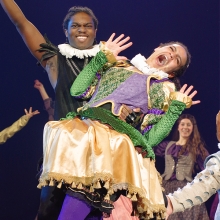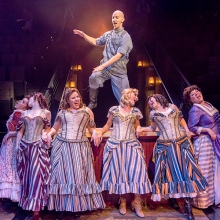Another National Anthem: The Legacy of Presidential Assassinations
Another National Anthem: The Legacy of Presidential Assassinations
 4th of July weekend is traditionally a time for Americans to celebrate the United States and the opportunities living here provides. But, as Stephen Sondheim and John Weidman’s musical Assassins and Sarah Vowell’s book Assassination Vacation observe, not everyone has access to the American Dream. In Assassins, Sondheim and Weidman offer depictions of successful and would-be presidential assassins, from John Wilks Booth (Lincoln) to Charles Guiteau (Garfield) to Sarah Jane Moore (Ford) to, of course, Lee Harvey Oswald (Kennedy). As the characters argue and vent their grievances, they exemplify the disillusionment of their particular time period. Author and National Public Radio commentator Sarah Vowell further gives voice to those feelings of alienation in her book, Assassination Vacation. Vowell documents her pilgrimage of sites relating to three presidential assassinations—that of Abraham Lincoln, James Garfield, and William McKinley—while connecting late 19th and early 20th century events and sentiments to those of our own time. Sondheim, Weidman, and Vowell’s works informthe legacy of presidential assassinations.
4th of July weekend is traditionally a time for Americans to celebrate the United States and the opportunities living here provides. But, as Stephen Sondheim and John Weidman’s musical Assassins and Sarah Vowell’s book Assassination Vacation observe, not everyone has access to the American Dream. In Assassins, Sondheim and Weidman offer depictions of successful and would-be presidential assassins, from John Wilks Booth (Lincoln) to Charles Guiteau (Garfield) to Sarah Jane Moore (Ford) to, of course, Lee Harvey Oswald (Kennedy). As the characters argue and vent their grievances, they exemplify the disillusionment of their particular time period. Author and National Public Radio commentator Sarah Vowell further gives voice to those feelings of alienation in her book, Assassination Vacation. Vowell documents her pilgrimage of sites relating to three presidential assassinations—that of Abraham Lincoln, James Garfield, and William McKinley—while connecting late 19th and early 20th century events and sentiments to those of our own time. Sondheim, Weidman, and Vowell’s works informthe legacy of presidential assassinations.
First, assassinations often actually change how a president is remembered. An assassination can turn an otherwise unremarkable president into a martyr. “It’s one of the few perks of assassination,” Vowell remarks. “In death, you get upgraded into a saint no matter how much people hated you in life.” She goes on to quote civil service reform advocate Henry Adams’ observation following President Garfield’s death: “The cynical impudence with which the reformers have tried to manufacture an ideal statesman out of the late shady politician beats anything in novel-writing.” Presidents controversial during their administration, such as Lincoln, suddenly become significantly less divisive, as Assassins’ Balladeer points out: “Lincoln, who got mixed reviews/Because of you, John, now gets only raves.” In shooting Lincoln for his alleged crimes against the country, John Wilks Booth actually guaranteed that future generations would gloss over those accusations for a more pristine view of the former President. Lee Harvey Oswald had a similar effect when he assassinated John F. Kennedy; killed three years into his administration, Kennedy is often remembered more for what he promised than for what he actually achieved.
Additionally, there is always an impressive nationwide outpouring of grief, even for presidents that probably weren’t thought much of in life. The President as a man is not always relatable; the President as a symbol always is. Sondheim elaborates in “Something Just Broke,” his song encapsulating the grief people feel after an assassination:
“You know what? As a president, he isn’t worth a lot…
He’s the kind that gets elected, then forgot.
Mr. Garfield—
Mr. Lincoln—
He’s a hack.
Bill McKinley—
—He’s a giant.
—He’s a joke.
Still, something just broke.”
The presidency is a powerful symbol even today. Vowell compares her passion for American history and politics with the devotion medieval peasants had for Christianity:
“Somewhere on the road between museum displays of Lincoln’s skull fragments and the ceramic tiles on which Garfield was gunned down and McKinley’s bloodstained pj’s it occurred to me that there is a name for travel embarked upon with the agenda of venerating relics: pilgrimage…And while I gave up God a long time ago, I never shook the habit of wanting to believe in something bigger and better than myself.”
Presidential assassins, therefore, do the opposite of what they intend by causing their targets to be remembered much more fondly than they would be otherwise.
A second legacy of presidential assassinations is how they make the social and political issues of their time much more concrete. The social and political climate of a historical time period can seem extremely abstract; presidential assassins like Leon Czolgosz, Lee Harvey Oswald, and Samuel Byck, however, show its human consequences. In a brief scene between Czolgosz and anarchist Emma Goldman, Weidman illustrates how Goldman’s beliefs gave the factory worker a sense of purpose and self-worth. Goldman hands him a pamphlet she says contains “an idea of social justice. Of a world in which men are not merely created equal but allowed to live that way.” Sondheim leaves no doubt that Czolgosz’ frustration with class structure—rooted in Goldman’s philosophy—was motivation in his assassination of President McKinley. “Saw of a sudden/How things were done,” sings the Balladeer in “The Ballad of Czolgosz.”
“Said, ‘Time’s a-wasting,
It’s nineteen-one.
Some men have everything
And some have none,
So rise and shine—
In the U.S.A.
You can work your way
To the head of the line.”
Oswald’s motivation in assassinating President Kennedy is still uncertain, but Weidman hints that Cold War interfering with his personal life may have been a contributing factor. Booth brings up Oswald’s defections—first to the Soviet Union, and then back to the U.S.—when goading him to commit the assassination. “You really love those morons, don’t you?” Booth asks Oswald of the FBI.
“Hell, why wouldn’t you? No one else cares if you live or die, those guys can’t get enough of you. ‘How was your day, Lee? Sell any secrets to the Soviets? Sabotage any defense plants? Kick off your shoes and tell us all about it!’”
Planning to fly a plane into the White House to kill Richard Nixon, Byck mails audio tapes of his rants to various public figures, including Leonard Bernstein. Like Czolgosz, Byck feels abandoned by a government that is supposed to help him: “We need to believe, to trust like little kids, that someone wants what’s best for us, that someone’s looking out for us. That someone loves us. Do they? No. They lie to us.” Unemployed and convinced that the government was oppressing the poor, Byck—along with Czolgosz and Oswald—makes past social and political issues seem much more real.
“If you can’t do the things you want to,” proclaim Sondheim and Weidman’s characters, “Then you do the things you can.” For Booth, Czolgosz, Oswald, and Byck, that meant killing a president. But from changing the way a country looks at a president to personifying their era’s social and political issues, the legacy of presidential assassins has certainly had a lasting effect.

For more information or to license, visit Assassins on MTI Shows.
To "click" with other Assassins fans, visit MTI ShowSpace.
Read an excerpt from Assassination Vacation on NPR's website or click here to learn more about Sarah Vowell.
Share
Callboard
-
Shake and shimmy it with the #Hairspray20Challenge! Join MTI and Broadway Media in celebrating 20 years of #Hairspray. Duet this here or find us on TikTok! Special thanks to @broadwaymedia and @jammyprod. Choreography Guides are a licensor official resource that provides step-by-step instruction from Broadway and professional choreographers for your productions! Visit @broadwaymedia to learn more. #mtishows #youcantstopthebeat #hairspraymusical #goodmorningbaltimore
View on Instagram
























